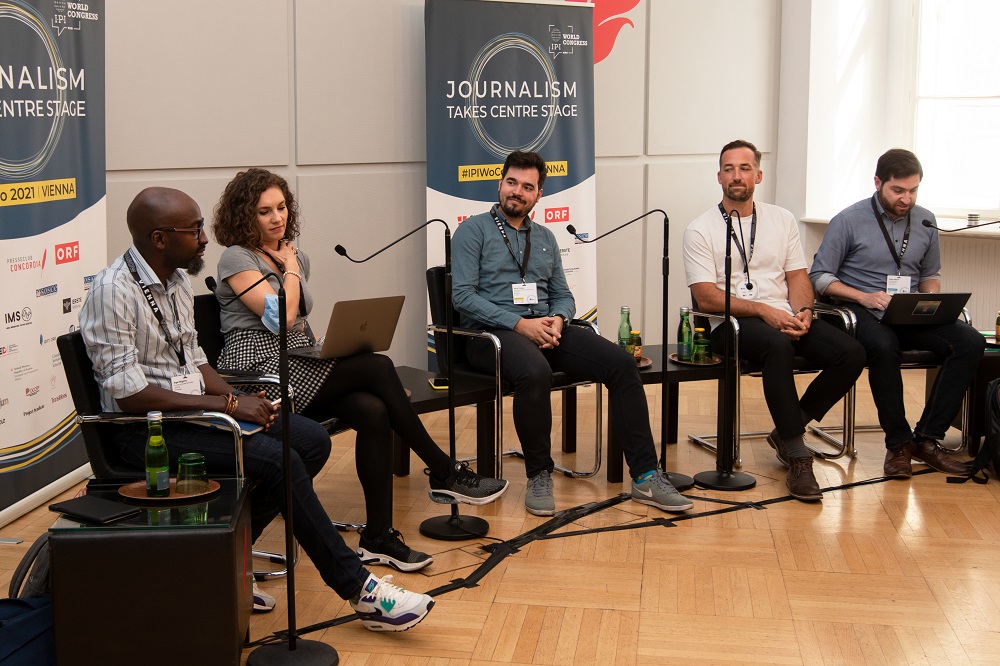How do we as media grab the attention of our audience and, most importantly, keep it? That was the central question of the IPI World Congress panel on Product Thinking, in which four journalists specializing in innovative journalism shared their views. The panel’s key takeaway: “We need to acknowledge that user needs have changed and that publishers’ roles in solving them has to change with it.” (Karl Oskar Teien) The conversation was moderated by Dávid Tvrdoň, subscription growth and retention specialist at Slovakia’s Petit Press.
Karl Oskar Teien from Norway’s Aftenposten presented one eye-catching statistic when it comes to readers: although people have an average daily screen time of 5 to 6 hours, only 5 to 10 percent of that is spent on news. As streaming services like Netflix grow quickly, how can journalists compete with these services?
The answer: by changing the way news is presented, he argues. “Half of all front page visits do not lead to a single article view”, Teien said. That’s why Aftenposten decided to present the article’s most important takeaways on the front page, explaining what has happened and why it matters in bullet points. “People are coming to the front page, so why not bring the news to the front page?”
Turkish journalist and presenter Nevşin Mengü agreed that journalists should start thinking more about how their audiences want to receive the news. “Young people in Turkey, for example, do not watch TV anymore”. To respond to this sea change in consumption, Mengü started a popular YouTube news channel in which she summarizes Turkey’s most important news of the day, in a 20-to 40-minute video.
Reaching new audiences is not easy, she acknowledged. It takes a 24/7 investment in the channel to build up a strong relationship with viewers. “What is different from a TV channel is that people feel like they’re part of a family when they subscribe to a YouTube channel. I am therefore always on my YouTube channel, I answer comments and I upload special content for my members.”
The transition to digital broadcasting demands commitment, but offers great flexibility, Mengü argued. “Just before this conference, I did my liveshot today and talked about the World Congress. After this talk, I will talk with my audience again. In this way, I give people the feeling that you’re part of what they’re doing.”
Like Mengü, The Continent’s Simon Allison explored how audiences receive and experience information in a world of constant news streams, which he called an “infodemic”. “Audiences do not know how to sort real information from fake information anymore.” On WhatsApp, users can share fake news with their friends, who then share it with a bigger group of friends, Allison explained. “Fake news flourishes by exponential growth.”
We’re now at 15,000 subscribers, after 18 months and 59 editions.
Without promotion.
The key to this is our readers, who support this work by sharing with an average of seven people.
And quality journalism. In a PDF format that can’t be censored and can be shared anywhere.
— Sipho Kings (@SiphoKings) September 16, 2021
The Continent, a news start-up focused on Africa, has decided to harness the potential of WhatsApp to spread quality information. It publishes a weekly e-paper with reliable news made especially for smartphones. Its 15,000 subscribers can easily share the e-paper with their friends via WhatsApp or Signal. “By using a PDF, we’re not bound by the messaging platform’s regulations or layout, like is the case when outlets publish on Facebook”, Allison explained. “And it’s impossible to censor, since WhatsApp is a private platform, and does not have an entryway in how we produce the newspaper.”
Breaking through in the attention economy is all about focusing on the readers’ needs, panelists agreed, and acknowledging that these needs can change. For this reason, the Zimbabwean community news outlet 263Chat has created community WhatsApp groups in which readers discuss political and societal issues, founder Nigel Mugamu explained. “My personal phone number is in all of these groups, so it can be chaotic”, he added jokingly.
Just like The Continent, 263Chat distributes an e-paper via WhatsApp to reach audiences with limited access to data, for example in rural Zimbabwean areas. “But we’re also here for the London commuter who spends 1.5 hours in the train every day and wants to read about Zimbabwean news”, Mugamu continued. “Most importantly, our goal is to think about the community, about how they want to receive information, instead of the other way around.”



